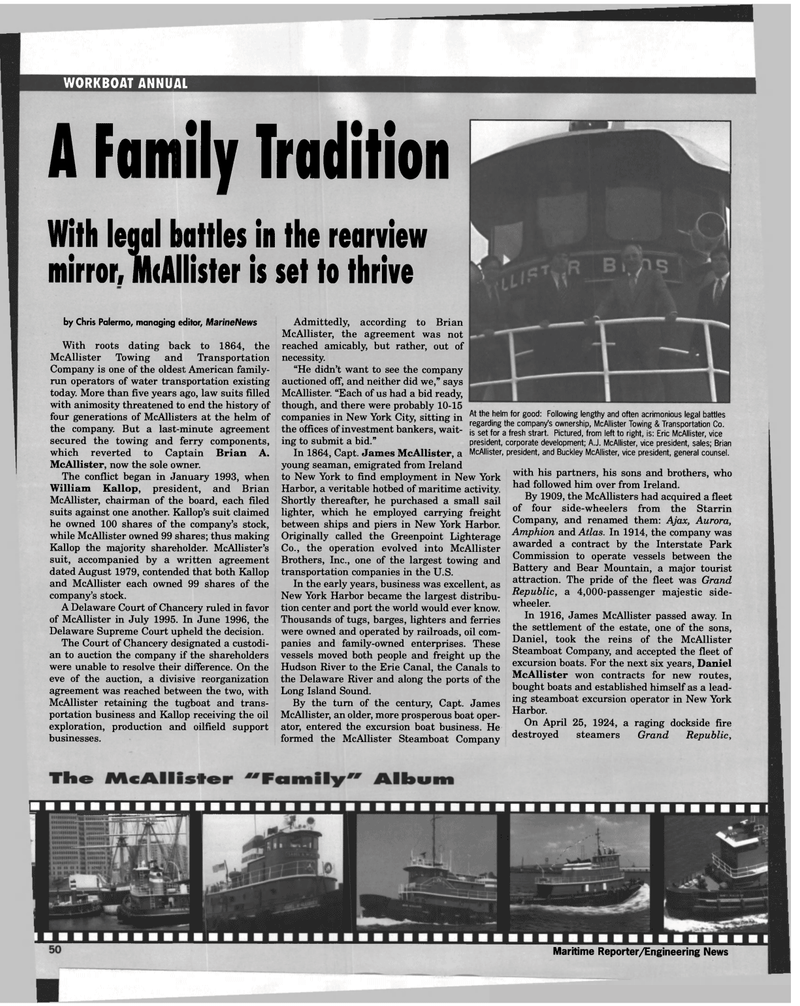
Page 50: of Maritime Reporter Magazine (November 1998)
Read this page in Pdf, Flash or Html5 edition of November 1998 Maritime Reporter Magazine
WORKBOAT ANNUAL 52 Maritime Reporter/Engineering News
A Family Tradition
With legal battles in the rearview mirror, McAllister is set to thrive by Chris Palermo, managing editor, MarineNews
With roots dating back to 1864, the
McAllister Towing and Transportation
Company is one of the oldest American family- run operators of water transportation existing today. More than five years ago, law suits filled with animosity threatened to end the history of four generations of McAllisters at the helm of the company. But a last-minute agreement secured the towing and ferry components, which reverted to Captain Brian A.
McAllister, now the sole owner.
The conflict began in January 1993, when
William Kallop, president, and Brian
McAllister, chairman of the board, each filed suits against one another. Kallop's suit claimed he owned 100 shares of the company's stock, while McAllister owned 99 shares; thus making
Kallop the majority shareholder. McAllister's suit, accompanied by a written agreement dated August 1979, contended that both Kallop and McAllister each owned 99 shares of the company's stock.
A Delaware Court of Chancery ruled in favor of McAllister in July 1995. In June 1996, the
Delaware Supreme Court upheld the decision.
The Court of Chancery designated a custodi- an to auction the company if the shareholders were unable to resolve their difference. On the eve of the auction, a divisive reorganization agreement was reached between the two, with
McAllister retaining the tugboat and trans- portation business and Kallop receiving the oil exploration, production and oilfield support businesses.
Admittedly, according to Brian
McAllister, the agreement was not reached amicably, but rather, out of necessity. "He didn't want to see the company auctioned off, and neither did we," says
McAllister. "Each of us had a bid ready, though, and there were probably 10-15 companies in New York City, sitting in the offices of investment bankers, wait- ing to submit a bid."
In 1864, Capt. James McAllister, a young seaman, emigrated from Ireland to New York to find employment in New York
Harbor, a veritable hotbed of maritime activity.
Shortly thereafter, he purchased a small sail lighter, which he employed carrying freight between ships and piers in New York Harbor.
Originally called the Greenpoint Lighterage
Co., the operation evolved into McAllister
Brothers, Inc., one of the largest towing and transportation companies in the U.S.
In the early years, business was excellent, as
New York Harbor became the largest distribu- tion center and port the world would ever know.
Thousands of tugs, barges, lighters and ferries were owned and operated by railroads, oil com- panies and family-owned enterprises. These vessels moved both people and freight up the
Hudson River to the Erie Canal, the Canals to the Delaware River and along the ports of the
Long Island Sound.
By the turn of the century, Capt. James
McAllister, an older, more prosperous boat oper- ator, entered the excursion boat business. He formed the McAllister Steamboat Company
At the helm for good: Following lengthy and often acrimonious legal battles regarding the company's ownership, McAllister Towing & Transportation Co. is set for a fresh strart. Pictured, from left to right, is: Eric McAllister, vice president, corporate development; A.J. McAllister, vice president, sales; Brian
McAllister, president, and Buckley McAllister, vice president, general counsel. with his partners, his sons and brothers, who had followed him over from Ireland.
By 1909, the McAllisters had acquired a fleet of four side-wheelers from the Starrin
Company, and renamed them: Ajax, Aurora,
Amphion and Atlas. In 1914, the company was awarded a contract by the Interstate Park
Commission to operate vessels between the
Battery and Bear Mountain, a major tourist attraction. The pride of the fleet was Grand
Republic, a 4,000-passenger majestic side- wheeler.
In 1916, James McAllister passed away. In the settlement of the estate, one of the sons,
Daniel, took the reins of the McAllister
Steamboat Company, and accepted the fleet of excursion boats. For the next six years, Daniel
McAllister won contracts for new routes, bought boats and established himself as a lead- ing steamboat excursion operator in New York
Harbor.
On April 25, 1924, a raging dockside fire destroyed steamers Grand Republic,

 49
49

 51
51
